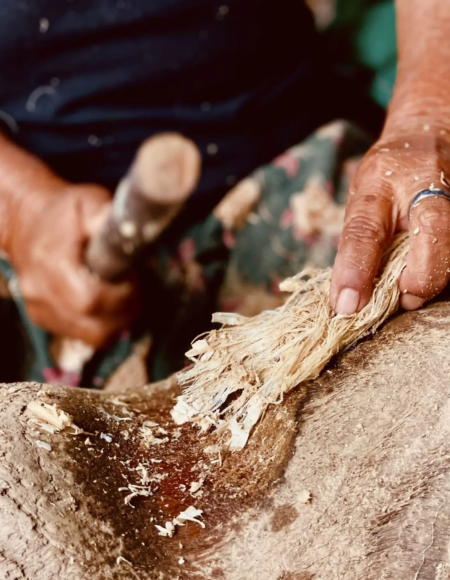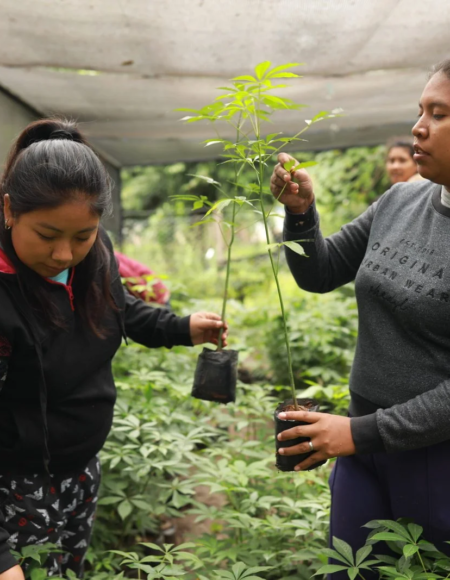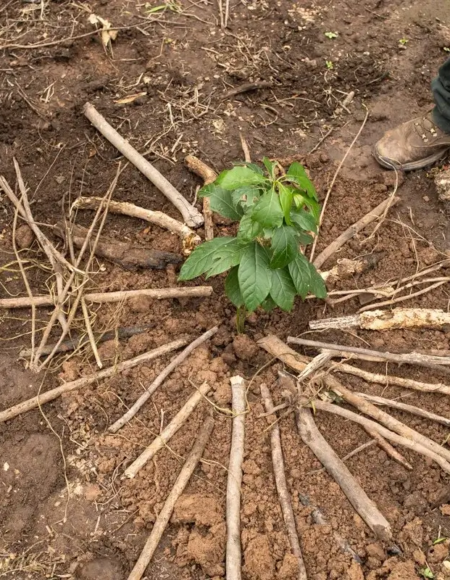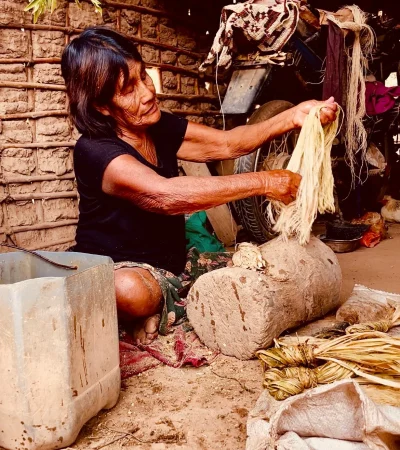We need you!
Many ways to make a difference for indigenous communities and regenerate the planet together. Discover and support our projects in the communities with just a few clicks, to regenerate the Chaco thanks to the wisdom and knowledge of the indigenous communities.
Perhaps you think that it is little and that it is not worth it, but you are wrong! Every minimal support we receive allows us to generate a direct impact in the Argentine Gran Chaco and improve the lives of indigenous families.
OUR PROJECTS
You can collaborate with the communities by buying packs of native trees of enormous value for biodiversity and to be planted in community territories. Carob trees, yuchanes, cebiles, lapachos and many others. Choose the quantity and species to your liking and you will be able to follow its growth annually.
An agroforestry system (SAF) is an innovative approach to agricultural production that integrates trees, crops and/or animals in the same area next to the native forest. These systems promote species diversity, soil conservation, water protection, and sustainable income generation. In addition to the environmental, social and economic benefits, SAFs guarantee food security, improve soil quality, create habitats for biodiversity, help mitigate climate change and generate employment opportunities.
By promoting the active participation of various groups, including women and youth, the SAFs become an integral and sustainable form of agricultural production that promotes the conservation of natural resources and strengthens the cohesion and well-being of communities.
The implementation of native tree nurseries empowers communities by allowing them to have full control over tree production, enriching community forests with highly valuable species. These nurseries provide the basic infrastructure, such as a semi-covered space, water supply, tools and training workshops. This enables community members to autonomously manage tree production and reforest their area.
Aim:
We seek to collaborate in increasing the diversity of traditional species that have disappeared due to overexploitation. The construction of native tree nurseries allows communities control over the tree production process. This implies from the collection of seeds to the selection of native species.
In addition, a financing system for replanted trees will be established, which will generate income for the communities and recognize their work in reforestation and monitoring.
The financing of a collective garden is crucial to promote food autonomy and community cohesion. In addition to family gardens, it is essential to have a common space where families can collectively produce healthy food, thus strengthening the ties between them. The budget contemplates the provision of basic tools, an elementary water infrastructure, the creation of compost, the supply of native seeds and the organization of community workshops. To guarantee shade, the orchard will be integrated into an agroforestry system.
Objective: Start up the orchard (MILPA planting) in less than 3 months and achieve the first harvest in less than 5 months.
Implementing a milpa planting system in the collective garden will contribute to maximizing food production in a sustainable manner, thus strengthening food security and community unity.
We seek that corn, beans and squash together form a complete and balanced diet, providing essential nutrients. In addition, the milpa helps to control pests and diseases in a natural way, dispensing with the need for pesticides and promoting crop diversity and the conservation of native seeds. It also fosters agricultural resilience by not relying on a single crop.
The annual pack of organic seeds for indigenous family gardens seeks to promote food sovereignty and health in these communities. It provides organic seeds of local and traditional varieties, adapted to the specific conditions of each region. Through the sowing and cultivation of these seeds, indigenous communities strengthen their cultural identity, preserve biological diversity and guarantee access to healthy and nutritious food, all in harmony with nature and the principles of sustainability.
Objective: the creation of the annual pack of organic seeds for indigenous family gardens is to promote food sovereignty and the health of these communities, strengthening their autonomy, resilience and connection to the land through the production of sustainable, healthy and culturally relevant food from an annual cycle.
The “Chaguar Plantation” project is carried out in communities of the Argentine Chaco in order to promote the reforestation of community chaguarales. These chaguarales play a crucial role in the production of handicrafts and contribute to strengthening family economies, especially through the participation of women in self-management.
Objective: The main objective of this project is to empower indigenous women by promoting economic self-management and strengthening family economies. Economic self-management gives these women greater autonomy and the ability to make decisions that have a significant impact on their lives and those of their communities. Through the reforestation of community chaguarales, it seeks not only to preserve the local ecosystem, but also to promote sustainable development and improve the living conditions of the communities involved.
To address ongoing deforestation in the Gran Chaco and protect indigenous communities from the violence they experience, it is essential to have the support of lawyers on the ground. It is necessary to stop deforestation activities and any form of violence as a priority, including agricultural practices that contaminate community members and their crops with chemicals.
Objective: Guarantee the collective ownership of the land of the indigenous communities through the establishment of a local legal defense network. This network must actively defend each community project, with the aim of protecting the territories and successfully carrying out regeneration activities in collaboration with the communities. In this way, the construction of a dignified and proper future is supported, in accordance with the cultural values of these communities.
Fast-growing and renewable, bamboo offers a sustainable building material and acts as a powerful carbon sink. It promotes the conservation of biodiversity, economic autonomy, cultural preservation, soil conservation and water management.
The integration of bamboo plantations fosters sustainable development while addressing environmental challenges and maintaining cultural identity.
Budget:
Packs of US$ 5 / 10 / 20 / 50 / 100 / 500
Aim:
The integration of bamboo plantations into communities provides a unique opportunity for sustainable development, while addressing environmental challenges and fostering economic opportunities. We aim to add value through education and training in bamboo processing techniques and bioconstruction.



YOU CAN MAKE ONE DIFFERENCE TODAY!
You can make a credit card donation to the Fund of the King Baudouin Foundation.
From Germany, Belgium, Denmark, France, Italy, Luxembourg, the Netherlands, Switzerland, the United Kingdom:
You can make an online donation through the King Baudouin Foundation (Brussels, Belgium). Citizens and organizations from these countries can make a donation through this link, and benefit from a tax advantage.
from the European Union:
Direct to Alianza Wichi account (IBAN)
IBAN: ES44 0049 6228 1329 1600 6517
SWIFT: BSCHESMM (BANCO SANTANDER)
From Argentina:
Local bank transfer
ALIAS: Alianza Wichi
CVU: 0000003100058976720556
HOW DO WE USE YOUR MONEY?
80% of the donations will be directly affected by direct expenses such as the purchase of raw materials, tools, wire fences, seeds, services of field technicians, etc.
Alianza Wichi reserves 20% of donations to maintain healthy management and necessary coordination of the organization’s activities.
The next annual report will be published in April 2024. We remain available if you have any questions, you can always contact us by email: info@lianzawichi.org

